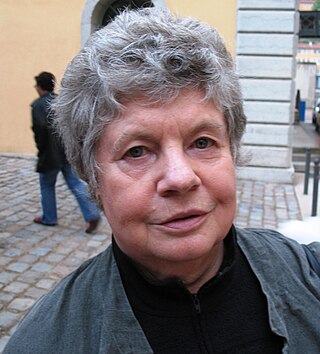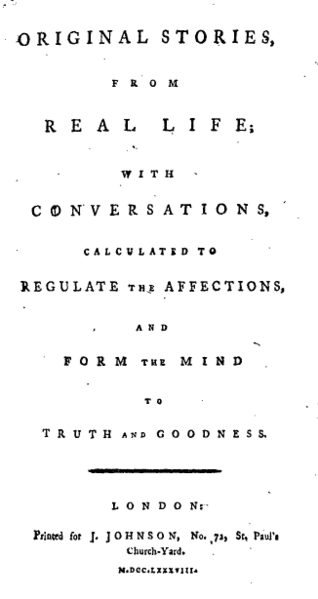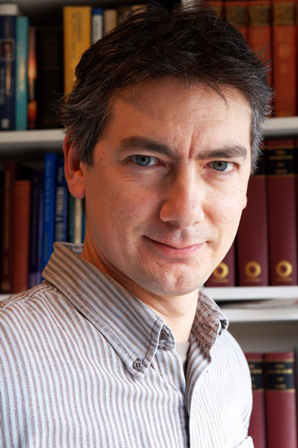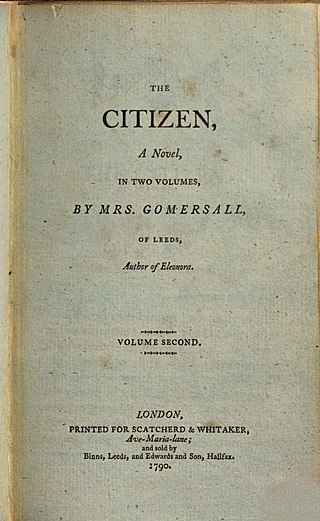
Jane Austen was an English novelist known primarily for her six novels, which implicitly interpret, critique, and comment upon the British landed gentry at the end of the 18th century. Austen's plots often explore the dependence of women on marriage for the pursuit of favourable social standing and economic security. Her works are implicit critiques of the novels of sensibility of the second half of the 18th century and are part of the transition to 19th-century literary realism. Her use of social commentary, realism, and irony have earned her acclaim amongst critics and scholars.

Japanese literature throughout most of its history has been influenced by cultural contact with neighboring Asian literatures, most notably China and its literature. Early texts were often written in pure Classical Chinese or lit. 'Chinese writing', a Chinese-Japanese creole language. Indian literature also had an influence through the spread of Buddhism in Japan.

Dame Antonia Susan Duffy, known professionally by her former married name, A. S. Byatt, was an English critic, novelist, poet and short-story writer. Her books have been translated into more than thirty languages.
Mary Dorcey is an Irish author and poet, feminist, and LGBT+ activist. Her work is known for centring feminist and queer themes, specifically lesbian love and lesbian eroticism.

The James Bond Dossier (1965), by Kingsley Amis, is a critical analysis of the James Bond novels. Amis dedicated the book to friend and background collaborator, the poet and historian Robert Conquest. Later, after Ian Fleming's death, Amis was commissioned as the first continuation novelist for the James Bond novel series, writing Colonel Sun (1968) under the pseudonym Robert Markham. The James Bond Dossier was the first, formal, literary study of the James Bond character. More recent studies of Fleming's secret agent and his world include The Politics of James Bond: From Fleming's Novels to the Big Screen (2001), by the historian Jeremy Black.
Denise Chong, OC is a Canadian economist and writer.
Natsuo Kirino is the pen name of Mariko Hashioka, a Japanese novelist and a leading figure in the recent boom of female writers of Japanese detective fiction.

Madeleine Thien is a Canadian short story writer and novelist. The Oxford Handbook of Canadian Literature has considered her work as reflecting the increasingly trans-cultural nature of Canadian literature, exploring art, expression and politics inside Cambodia and China, as well as within diasporic East Asian communities. Thien's critically acclaimed novel, Do Not Say We Have Nothing, won the 2016 Governor General's Award for English-language fiction, the Scotiabank Giller Prize, and the Edward Stanford Travel Writing Awards for Fiction. It was shortlisted for the 2016 Man Booker Prize, the 2017 Baileys Women's Prize for Fiction, and the 2017 Rathbones Folio Prize. Her books have been translated into more than 25 languages.

Lisa Gracia Tuttle is a British science fiction, fantasy, and horror author. She has published more than a dozen novels, seven short story collections, and several non-fiction titles, including a reference book on feminism, Encyclopedia of Feminism (1986). She has also edited several anthologies and reviewed books for various publications. She has been living in the United Kingdom since 1981.
Literary realism is a literary genre, part of the broader realism in arts, that attempts to represent subject-matter truthfully, avoiding speculative fiction and supernatural elements. It originated with the realist art movement that began with mid-nineteenth-century French literature (Stendhal) and Russian literature. Literary realism attempts to represent familiar things as they are. Realist authors chose to depict every day and banal activities and experiences.

Original Stories from Real Life; with Conversations Calculated to Regulate the Affections, and Form the Mind to Truth and Goodness is the only complete work of children's literature by the 18th-century English feminist author Mary Wollstonecraft. Original Stories begins with a frame story that sketches out the education of two young girls by their maternal teacher Mrs. Mason, followed by a series of didactic tales. The book was first published by Joseph Johnson in 1788; a second, illustrated edition, with engravings by William Blake, was released in 1791 and remained in print for around a quarter of a century.
Jennifer Crusie is a pseudonym for Jennifer Smith, an author of contemporary romance novels. She has written more than twenty novels, which have been published in 20 countries.

Duncan Wu is a British academic and biographer.

Kerry Isabelle Greenwood is an Australian author and lawyer. She has written many plays and books, most notably a string of historical detective novels centred on the character of Phryne Fisher, which was adapted as the popular television series Miss Fisher's Murder Mysteries. She writes mysteries, science-fiction, historical fiction, children's stories, and plays. Greenwood earned the Australian women's crime fiction Davitt Award in 2002 for her young adult novel The Three-Pronged Dagger.
Jane Austen's (1775–1817) distinctive literary style relies on a combination of parody, burlesque, irony, free indirect speech and a degree of realism. She uses parody and burlesque for comic effect and to critique the portrayal of women in 18th-century sentimental and Gothic novels. Austen extends her critique by highlighting social hypocrisy through irony; she often creates an ironic tone through free indirect speech in which the thoughts and words of the characters mix with the voice of the narrator. The degree to which critics believe Austen's characters have psychological depth informs their views regarding her realism. While some scholars argue that Austen falls into a tradition of realism because of her finely executed portrayal of individual characters and her emphasis on "the everyday", others contend that her characters lack a depth of feeling compared with earlier works, and that this, combined with Austen's polemical tone, places her outside the realist tradition.

Romanticism was an artistic, literary, and intellectual movement that originated in Europe toward the end of the 18th century. Scholars regard the publishing of William Wordsworth's and Samuel Coleridge's Lyrical Ballads in 1798 as probably the beginning of the movement in England, and the crowning of Queen Victoria in 1837 as its end. Romanticism arrived in other parts of the English-speaking world later; in the United States, about 1820.
Daisy Hay is Associate Professor in English Literature and Life Writing at the University of Exeter and an author of non-fiction. Hay was elected a fellow of the Royal Society of Literature in 2018.
Heather Elizabeth Ingman is a British academic, noted for her work on Irish and British women's writing, the Irish short story, gender studies and modernism. Also a novelist and journalist, Ingman has worked in Ireland and the UK, especially at Trinity College Dublin, where she is an adjunct professor of English and Research Fellow in Gender Studies.

Maggie Humm is an English feminist academic and emeritus professor of cultural studies at the University of East London. She has written on feminism and modernism, particularly the work of Virginia Woolf.

Ann Gomersall was a British novelist of the Romantic-era who paid close attention to economic and social issues in her writing.












